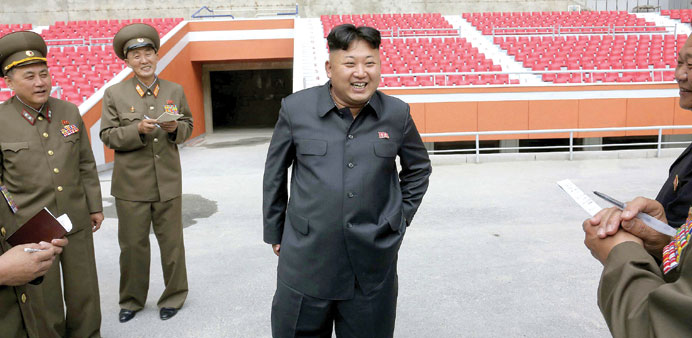EXECUTIVE: North Korean leader Kim Jong Un gives field guidance to the construction site of the Wisong Scientists Street in Pyongyang. Kim Jong Un has complained that the Hydro-meteorological Service issues “too many inaccurate forecasts.”
By Steff Gaulter
I wouldn’t like to be a meteorologist in North Korea at the moment. Other than the obvious drawbacks of living in such a reclusive country (such as extreme poverty, lack of technology and the ban on foreign travel), it now seems that the meteorologists have earned the wrath of Kim Jong Un.
The supreme leader of North Korea is not the ideal person to upset, given the succession of executions he has ordered, including that of his uncle and his ex-girlfriend. He’s rumoured to be even more ruthless than his father.
Kim Jong Un has complained that the Hydro-meteorological Service issues “too many inaccurate forecasts.” Whether he’s right or not, I’ve no idea, I certainly don’t have access to that information, but I would argue that it’s a positive move that Kim Jong Un has taken an interest in the forecasts.
North Korea is a country which struggles to feed itself. Even in a good year, the country relies on external aid to feed its people. Unicef, the United Nations Children’s Fund, warned that a whole generation of children are not getting the well-rounded diets needed for development. Last year they estimated that one-third of North Korean children suffer from malnutrition and are showing signs of stunted growth.
The lack of food is not helped by the fact that North Korea is not an easy place to grow crops. Much of the country is covered by rugged mountains, with less than a fifth of the land suitable for farming.
Every available scrap of land is tilled and farmed, even the rocky hillsides and the narrow strips of grass along the roads. Across the country, huge swathes of forest have been cut down, leaving no protective cover. If it rains, the water simply screams down the mountainside, giving a greater risk of flash flooding and landslides.
As you might expect in what is one of the poorest nations in the world, the farming methods in North Korea are fairly primitive. The vast majority of the farmers rely on natural rainwater and they usually grow the same crop year after year. This means the soil becomes depleted of essential nutrients and there is also a greater chance of pests developing in the soil. This inevitably leads to a serious reduction in productivity.
With food amounts being on a knife edge, it doesn’t help that North Korea is no stranger to natural disasters. 2012 was a particularly bad year; in June, the state-run news agency reported that it was experiencing its worst drought in a century. This was quickly followed by severe flooding. One weather system after another crossed the country, bringing batch after batch of flash flooding. Towards the end of July, Tropical Depression Khanun hit the country. Torrential rain fell across the country and the government reported that this storm alone caused the death of 88 people.
Tropical Depression Khanun was followed by yet more heavy rain, and then, just one month later, another two tropical systems slammed into the Korean Peninsula. The first storm was named Bolaven, followed by Tembin just two days later. Tembin was far weaker than Bolaven, but many parts of North Korea were already flooded and Tembin only exacerbated the situation.
An accurate forecast from the Korean Meteorological Administration may not have prevented the flooding, but it could certainly have helped those living in vulnerable areas. Evacuation of regions prone to landslides, and from villages near floodplains would almost certainly have saved lives.
If the forecasts in North Korea are inaccurate, then arguably the one person in North Korea who can really make a difference is Kim Jong Un. Countries which have the most accurate forecasts don’t just have good meteorologists, but have also invested large amounts of money into equipment and research. If the forecasts are to be improved, it will cost money.
Back in 2011, the Director of the Climate and Water Department of the World Meteorological Organisation, Avinash Tyagi, visited North Korea. He was horrified with the state of the equipment and computers used by the Hydro-meteorological Department, saying they were in urgent need of replacement. Even in the 186 observation stations, the equipment was outdated, dating back to the 1970 and 80s.
Have you ever tried to use a computer that’s 10 years old? You’ll be lucky if it’s still working! With equipment over 40 years old, it is hardly surprising that the forecasts are not as accurate as they might be. In fact, it’s impressive they’re producing forecasts at all!
What’s concerning is that if no investment has been made in the equipment, precious little will have been invested in research. No other country will have been studying the weather of the reclusive nation, so even if a large investment is made today, then it will still take years for North Korea to catch up with the skills already utilised in rest of the world.
More accurate forecasts will certainly help the population, particularly the poorest people who are most vulnerable to flooding and droughts. So, if Kim Jong Un has finally taken an interest in the Meteorology, and is willing to invest in modern technology and research, then that can only be a good thing, as long as he doesn’t execute anyone in the process.

